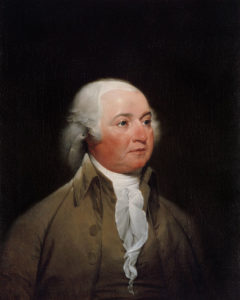
Listen to or download this week’s radio program:
© 2017 Don Pinson | [Download]
(Link not working? Right-click and select “Save As”.)
The Bible says, “Remember those who led you…” (Hebrews 13:7) Yet, in America we’ve forgotten what those who founded this nation were like. We no longer know how they thought or what they did. Someone has truthfully described us as having “national amnesia”.
 The great danger in a nation forgetting its past is that they will lose the foundational ideas that made that nation great. We’re missing out on the inspiration provided by the stories of our ancestors who did amazing things to birth, grow, and protect America. Worse still, we’re missing the interventions by God Himself so that we no longer credit Him with America’s existence. Thus we lose the very Strength Who has brought the good to us which we now enjoy.
The great danger in a nation forgetting its past is that they will lose the foundational ideas that made that nation great. We’re missing out on the inspiration provided by the stories of our ancestors who did amazing things to birth, grow, and protect America. Worse still, we’re missing the interventions by God Himself so that we no longer credit Him with America’s existence. Thus we lose the very Strength Who has brought the good to us which we now enjoy.
A renowned minister, A.W. Foljambe, spoke great wisdom when he said in 1876:
“The more thoroughly a nation deals with its history, the more decidedly will it recognize and own an over-ruling Providence [in it], and the more religious a nation [it will] become; while the more superficially it deals with its history, seeing only secondary causes and human agencies, the more irreligious will it be.”
One of the greatest ways to rediscover our past is simply to read the statements of our Founding Fathers. They wrote a great deal in journals and documents just so the following generations could know the foundational ideas on which they birthed and built this nation into the greatest in world history. They didn’t claim that they came up with these ideas. They constantly acknowledged the Bible to be the source of this wisdom.
Let’s look at some statements of one of America’s Founders, John Adams. He gave over fifty years of his life in the service of his country. He signed the Declaration of Independence. He was an Ambassador, Vice President under Washington, then finally President. He was very qualified to speak about the founding principles on which this nation was built. He was willing to lay his all on the altar of liberty that his children might have opportunity to hear the truth of the Gospel in all areas of life. He wrote:
“If it be the pleasure of Heaven that my country shall require the poor offering of my life, the victim shall be ready, at the appointed hour of sacrifice, come when that hour may. But while I do live, let me have…a free country!”
(1025. Adams, John. In contemplating the personal effect that separation from England would produce. Henry Steele Commager and Richard B. Morris, eds., Spirit of Seventy-Six (New York: The Bobbs-Merrill Co., Inc., 1958), p. 26. Peter Marshall and David Manuel, The Glory of America (Bloomington, MN: Garborg’s Heart’N Home, Inc., 1991), 6.5.)
 When some delegates in Philadelphia were hesitating to make the break with England, he urged them to approve, that very day, the Declaration of Independence. He told them:
When some delegates in Philadelphia were hesitating to make the break with England, he urged them to approve, that very day, the Declaration of Independence. He told them:
“Before God, I believe the hour has come. My judgment approves this measure, and my whole heart is in it. All that I have, and all that I am, and all that I hope [for] in this life, I am now ready here to stake upon it. And I leave off as I began, that live or die, survive or perish, I am for the Declaration. It is my living sentiment, and by the blessing of God it shall be my dying sentiment. Independence now, and Independence forever!”
(1026. Adams, John. July 1, 1776, in speaking to the delegates of the Continental Congress. Daniel Webster, “Speech of John Adams,” William H. McGuffey, McGuffey’s Eclectic Fifth Reader (Cincinnati and New York: Van Antwerp, Bragg & Co., revised edition, 1879; NY: American Book Company, 1907; revised 1920), lesson LXVI, p. 199. Peter Marshall and David Manuel, The Light and the Glory (Old Tappan, NJ: Fleming H. Revell Company, 1977), pp. 307-308.)
The delegates heeded Adams’ words and voted that day to approve the Declaration of Independence.
John Adams had always believed God had birthed America for the purpose of getting the Gospel to the world. Their work that day in Philadelphia would create a national government that would begin to secure that purpose. He summed up his feelings about America when he wrote:
“I always consider the settlement of America with reverence and wonder, as the opening of a grand…design in Providence for the illumination of the ignorant, and the emancipation of the slavish part of mankind all over the earth.”
(1013. Adams, John. February 1765, in his notes for A Dissertation on the Canon and Feudal Law. Benjamin Franklin Morris, The Christian Life and Character of the Civil Institutions of the United States (Philadelphia: George W. Childs, 1864), p. 109. J. Eidsmoe, Christianity and the Constitution (Grand Rapids, MI: Baker Book House, A Mott Media Book, 1987; 6th printing, 1993), p. 266.)
Did you realize that was why God birthed America? Are you teaching it to you children?
Think about it; because if you don’t, someone else will do your thinking for you—and for your children! And you won’t like what that brings to you. I’m Don Pinson; this has been Think About It.
